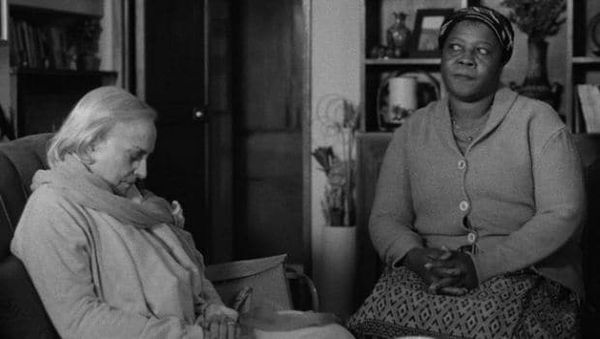Eye For Film >> Movies >> Tabu (2012) Film Review
Tabu
Reviewed by: Owen Van Spall

Miguel Gomes' Tabu has been somewhat inevitably compared to current 2012 Oscar favourite The Artist. Both pay homage to the history and power of cinema, both are set in the past and play on the illusions of a golden era, and both are silent films presented in black and white. To be precise, in the case of Tabu the second half of the movie is absent dialogue, with certain diagetic sounds remaining and a narration taking over to guide the audience.
Having earned the Alfred Bauer Prize at the Berlinale 2012 awards, Miguel Gomes' flawed but lyrical and intriguing film should be able to step out of The Artist's shadow. It's a story of love, obsession and memory, about how the further we move from the past, the brighter it can burn in our minds. It also takes on Portuguese colonial history and how this has been addressed in images, and in personal and cultural memory.

Tabu - whose title pays homage to FW Murnau's 1931 silent film set in Tahiti - is actually a film of three segments though, to many, it will feel like two, the first mini section is a short coda in which we are treated to, in black and white, a droll tale of a jungle explorer haunted by his dead lover until he is driven to feed himself to a crocodile. The odd crocodile motif will show up again.
The film proper begins in present day Lisbon, the film remaining black and white, but using modern shooting and framing techniques with normal synced audio dialogue. The tone seems almost deliberately droll, the lives of the characters we see, steady and monotonous. We are introduced to Pilar (Teresa Madruga), a devoted Christian and good neighbour to Aurora (Laura Soveral), an elderly Portuguese woman who lives with her Cap Verdean housekeeper next door. Right away we see Aurora is hard work - gambling her money away, regularly insulting and accusing her housekeeper (Isabel Cardoso), who stoically stays in her post. But when the old lady dies, Pilar finds herself in possession of a scrap of information that she impulsively follows up, and stumbles upon an old lover of Aurora from her days as a wealthy colonial out in 1960s Africa.
This encounter sparks the second (third if you count the opening coda) section of the film which transports us to a 1960s Portuguese colony in Africa, which seems deliberately constructed on screen to vividly contrast with the grey nostalgia-addled modern Lisbon we saw earlier, as if we are entering a burnished memory palace of the exotic.
Our guide now becomes Aurora's lover Gian Luca Ventura (Carloto Cotta), whose poetic voice over replaces the characters' on-screen dialogue and much of the diagetic sound. He shows us the epic tale of his illicit love affair with the privileged Aurora. He's until now been an aimless wanderer, whose arrival in Africa comes at the tail end of a long winding road of broken hearts and bad debts.
This is all inescapably romantic and magically real, given the colonial Old World setting and the nods to the technical limitations of the silent film era. This is, of course, the 1960s, but given the privileged bubble lifestyles of the colonials it could easily be decades earlier. This section of the film is titled “Paradise”, and certainly the years it depicts on screen seem to be delivering all that the characters in the first section were lacking: stirring melodrama, slapstick and passion. There are fierce gazes, snatched moments, epic landscapes, letters professing heartbreak and agony. The lighting often offers strong contrasts and harks back to the glory of German expressionist films. But as the crocodile image suggests, all this passion and fury ends in the jaws of the beast. Never far off sit the realities of colonialism and its ultimate end, the fantasy and the dark side both co-existing in front of us as if to tease and warn.
Director Gomes pays homage to the fantasy of colonial history while subverting it at the same time, and likewise seems to do the same with the elements of film history and genres his film pays homage to. Tabu does take a while to lift off given the more staid first half, but it nevertheless offers a fascinating and possibly baffling multilayered journey into a semi-real world that encompasses colonial memory versus reality, romance versus loneliness, youth versus age, the everyday versus the epic. It is a strange combination of comparisons and contrasts that requires much time to digest.
Reviewed on: 19 Feb 2012


















